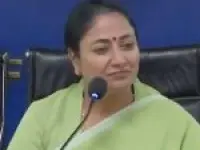
US Speaks Again On Arvind Kejriwal's Arrest; Mentions Congress' Frozen Accounts (image-twitter/StateDeptSpox)
India on Wednesday summoned a US diplomat over the remark on the arrest of the Delhi chief minister Arvind Kejriwal in the liquor policy case. Meanwhile, the US reiterated its call for “fair, transparent, timely legal process”.
US State Department spokesperson Matthew Miller said that they would continue to follow these actions closely including the arrest of the Delhi chief minister. He was responding to the questions on India summoning Gloria Berbena, the US Acting Deputy Chief of Mission in New Delhi.
The meeting held at the foreign ministry’s South Block office lasted nearly 40 minutes on Wednesday as India has strongly opposed the US remark on the arrest of Kejriwal. While responding to the freezing of the Congress party’s bank account, Matthew Miller said, “We are also aware of the Congress party”s allegations that tax authorities have frozen some of their bank accounts in a manner that will make it challenging to effectively campaign in the upcoming elections”.
Watch the Daily Press Briefing from the State Department. https://t.co/P7maPwz5jz
— Matthew Miller (@StateDeptSpox) March 27, 2024
When enquired about India summoning the US diplomat, Miller refused to make any comment citing “private diplomatic conversations”. Following the arrest of Arvind Kejriwal, the US Department has called on New Delhi to ensure “a fair and timely legal process” for the jailed chief minister. India has objected to it and warned of “unhealthy precedents”.
The foreign ministry responding to the remark said, “states are expected to be respectful of the sovereignty and internal affairs of others, and this responsibility is even more so in case of fellow democracies. It could otherwise end up setting unhealthy precedents”.
The German Foreign Office just days before the US remark also made a comment stressing that Arvind Kejriwal is entitled to a fair and impartial trial. The Indian government had reacted strongly and summoned the German envoy, labeling their remark “blatant interference in internal matters”.













